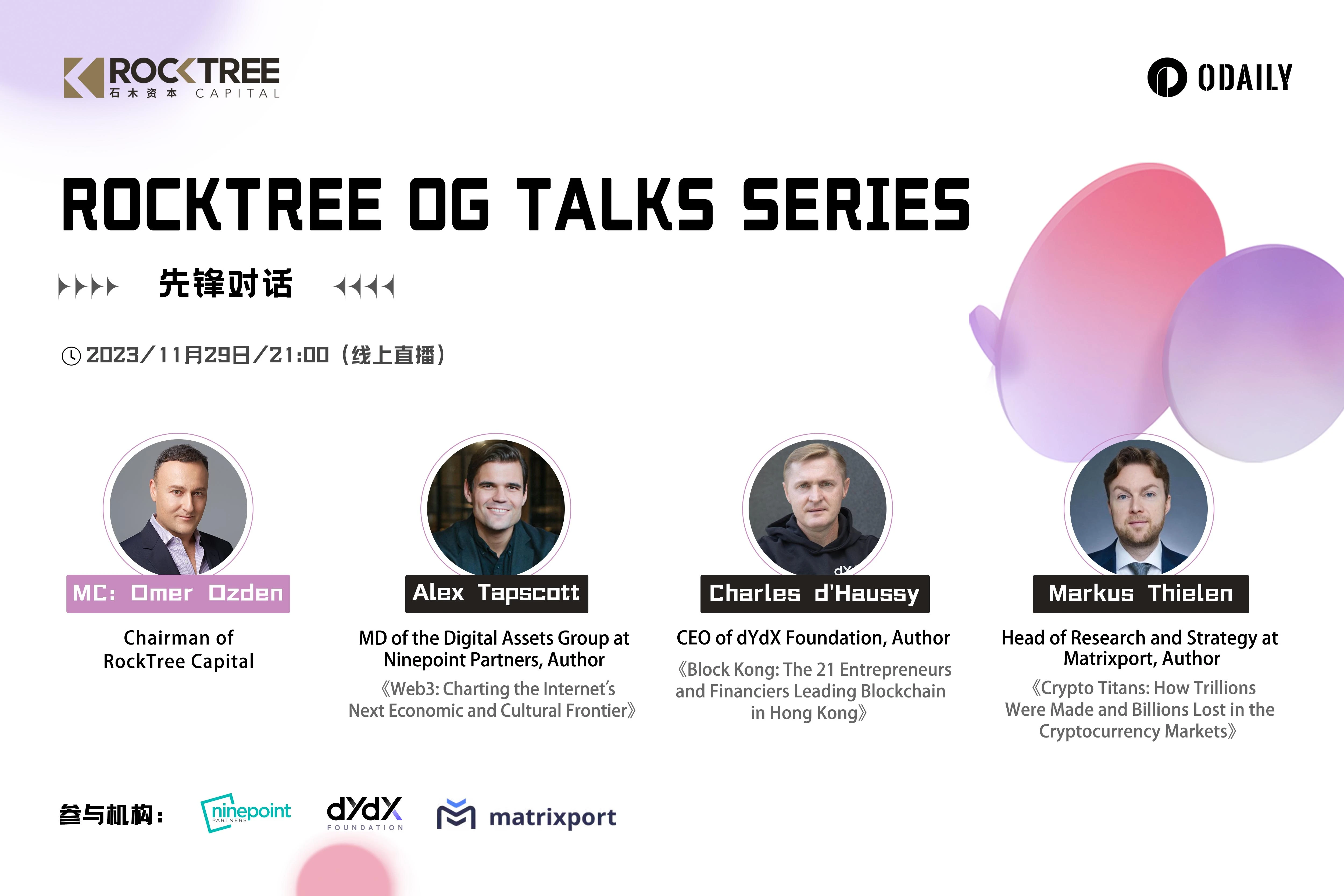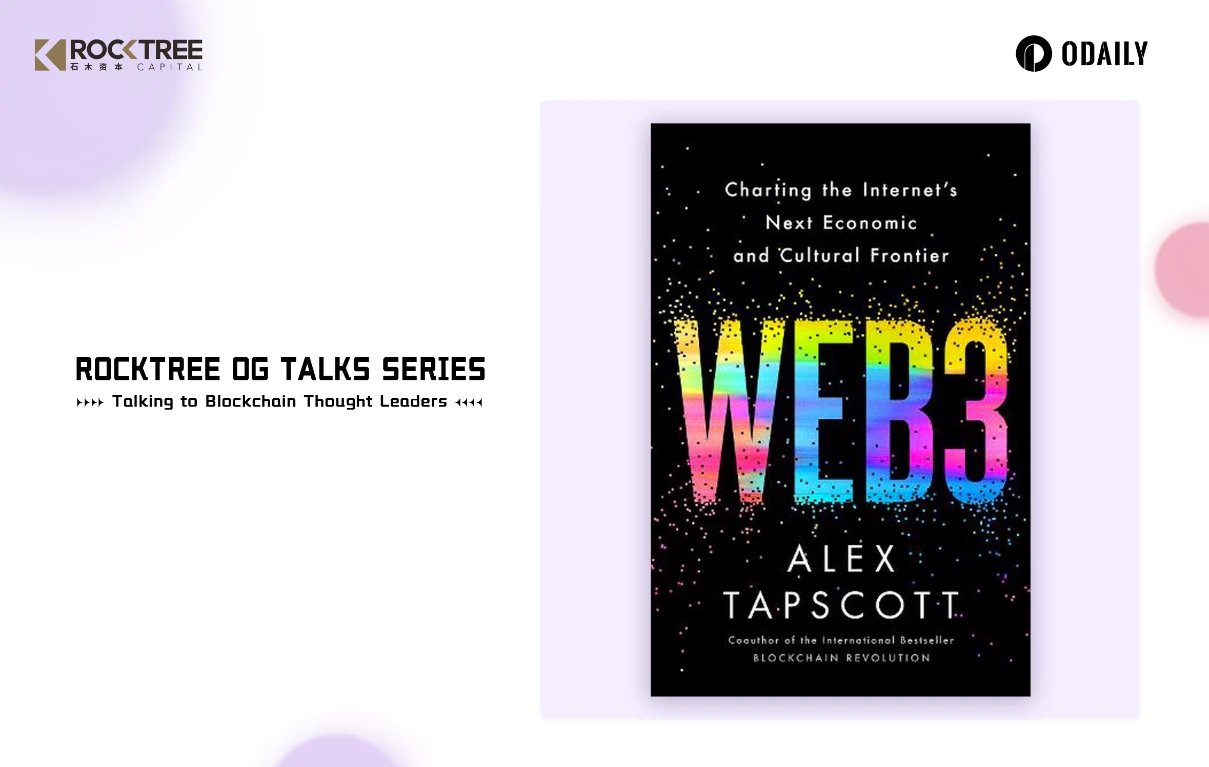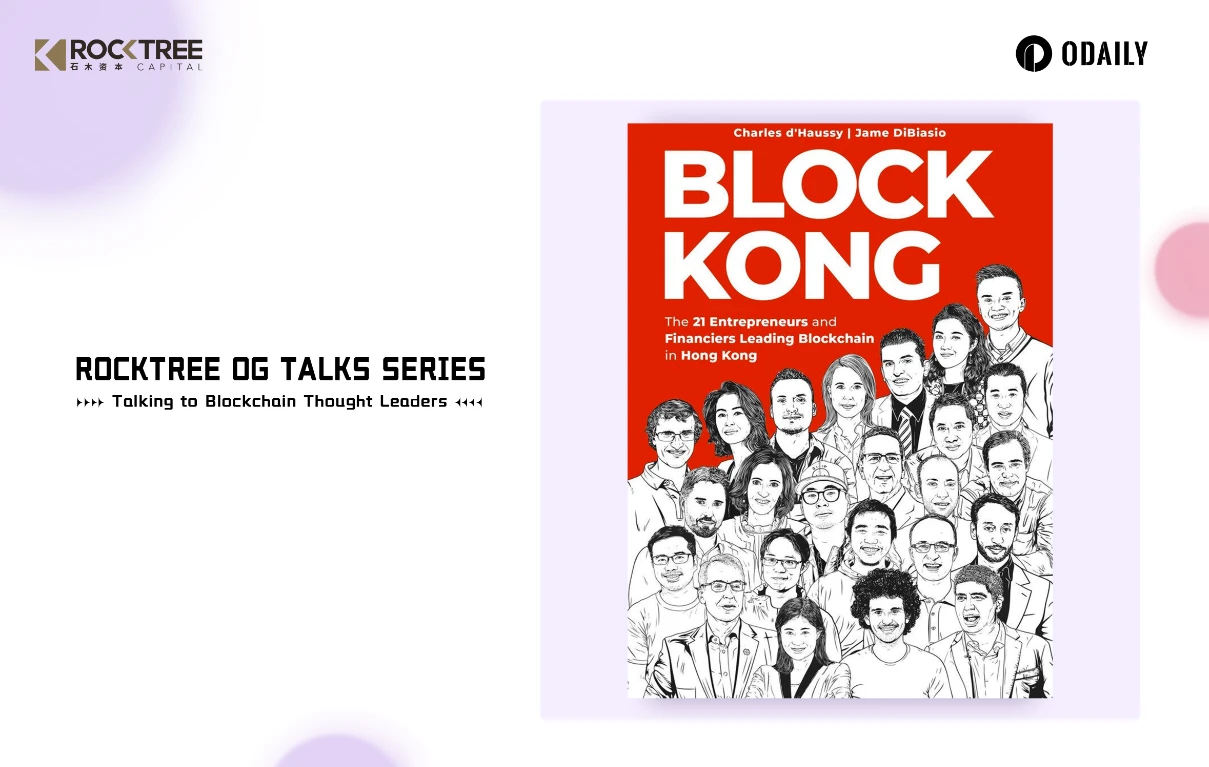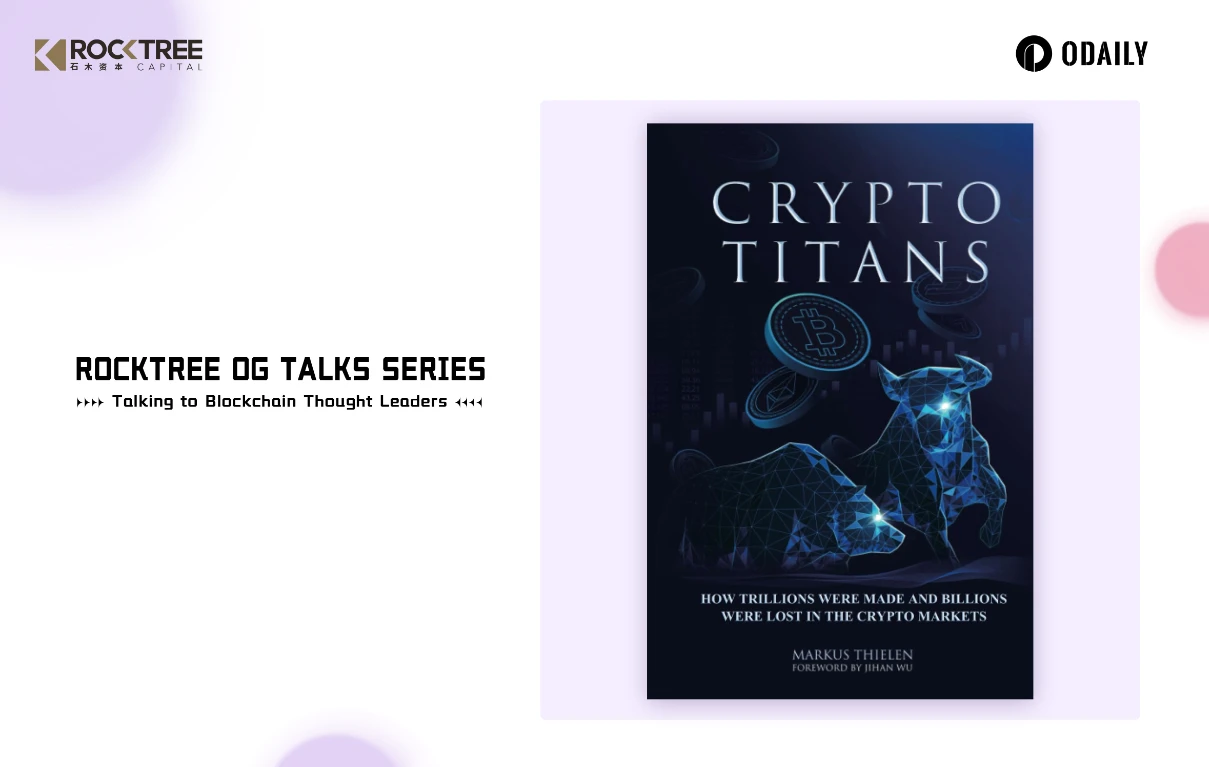RockTree OG Talks The series of roundtable talks is co-organized by Stonewood Capital and. In each issue of OG Talks, Stonewood Capital will gather pioneers in the field of Web 3.0 to bring the audience in-depth OG views and the latest information from top companies in each track.
At 21:00 on November 29, this roundtable discussion hosted by Dr. Omer Ozden, Chairman of Stonewood Capital and International Partner of ZhenFund, started with the theme of Pioneer Dialogue. The three guests were: dYdX Foundation CEO Charles dHaussy, Matrixpor head of research and strategy Markus Thielen, Ninepoint Partners head of digital assets Alex Tapscott. In this roundtable discussion, the guests discussed the latest trends in the industry, BTC ecology and hot events.

The following is a transcript of the roundtable conversation, condensed and compiled by Odaily.
Omer Ozden:Hello everyone, I am Omer Ozden, Chairman of Stonewood Capital and International Partner of ZhenFund,Stonewood Capital is an international fund and commercial bank. We are based in North America and Greater China and focus on investing in the development of cutting-edge technologies, especially early-stage investments and ecological support for leading blockchain and other high-tech companies. We have established strategic alliances with the worlds leading funds, exchanges, media, etc., and are committed to providing high-value strategic investment support and global accelerated growth services to top entrepreneurs and Web3.0 projects.
MC:Omer Ozden, Chairman of RockTree Capital
👉https://twitter.com/OmerOzden0x
Next, let me introduce today’s guests:
The first guest is Alex Tapscott, author of the book Web3 and co-authored with his father Don Tapscott, the seminal work in the field of blockchain Blockchain Revolution. The book Blockchain Revolution was published in 2016 and had a profound impact on the industry. Alex currently serves as the Managing Director of the Digital Asset Group at Ninepoint Partners and lives in Toronto, Canada.
Alex Tapscott
MD of the Digital Assets Group at Ninepoint Partners, Author
《Web3: Charting the Internet’s Next Economic and Cultural Frontier》
👉https://twitter.com/alextapscott
👉Amazon:https://www.amazon.com/Web3-Charting-Internets-Economic-Cultural/dp/006329995 X
The second guest is Charles dHaussy, CEO of the dYdX Foundation. Over the past three years, RockTree invested in dYdX during the last round of the bull market and worked closely with it to help accelerate its growth in Asia. Charles has deep roots in Hong Kong, where he maintains good relationships with both the city’s fintech community and the government. He is also the author of “Block Kong,” which tells the stories of 21 entrepreneurs who shaped Hong Kong’s crypto industry during the last bull cycle. Charles is also a China expert, and his books are already on the market in both Chinese and English versions.
Charles dHaussy
CEO of dYdX Foundation, Author
《Block Kong: The 21 Entrepreneurs and Financiers Leading Blockchain in Hong Kong》
👉https://twitter.com/charlesdhaussy
👉https://twitter.com/dydxfoundation
👉Bookazine:https://bookazine.com.hk/products/9789887551997?variant=39336458256470
The third guest is Markus Thielen, Head of Research and Strategy at Matrixport. I personally look forward to speaking with him as he has a wealth of knowledge and insights in this area. He has engaged in important scientific research related to Bitcoin at a fund management institution, and has also worked with industry OG Wu Jihan in the past. He is the author of Crypto Titans—How Trillions Are Made and Billions Are Lost. Very much looking forward to what he shares today.
Markus Thielen
Head of Research and Strategy at Matrixport, Author
《Crypto Titans: How Trillions Were Made and Billions Lost in the Cryptocurrency Markets》
👉https://twitter.com/GetDeFiResearch
👉Amazon:
https://www.amazon.com/Crypto-Titans-trillions-billions-cryptocurrency-ebook/dp/B0C4CX5SLT?_encoding=UTF8&qid=1691990845&sr=8-1&linkCode=sl1&tag=cryptotitans-20&linkId=1dcfb60277b9189f3afc05bcc6cf7acd&language=en_US&ref_=as_li_ss_tl
Omer Ozden: Alex is a globally recognized author, speaker, investor and consultant. You published the masterpiece Blockchain Revolution 7 years ago, and in recent years you published a new book Web3. Through these 7 years of development, what do you think is the most obvious change in the world? What changes will occur in the Web3 field in the next 2-3 years?
Alex Tapscott:I want to share two perspectives. First, when I published my first book, Blockchain Revolution, I noticed that the size of the cryptoasset market was not large, with a total market capitalization of only about $7 to $8 billion, which was equivalent to a limited-scale public company. Now, this market has grown to $1.5 trillion, which shows the tremendous growth and accumulation of the market in the past few years.
Secondly, I noticed the evolution of the entire network environment and the Internet. After nearly 30 years of development, the Internet has gradually evolved from an information network into the current value network, thanks to the advancement of blockchain technology. In addition, due to the small size of the market seven years ago, the user cases and business opportunities in the market were relatively limited. The business opportunities and user cases we envisioned at that time are now gradually moving from virtual to real. Seven years ago, the main asset on the market was Bitcoin. Now, whether it is in financial technology, insurance, trading, risk hedging, energy industry, culture or even physical infrastructure, there is a footprint in the crypto industry. The exploration back then is now gradually Landed.
In the new book, I elaborate on three core ideas: First, blockchain and the technology behind it should not be viewed as a branch of fintech. I think fintech is about developing specific applications around blockchain, such as converting physical wallets and credit cards into digital wallets. Blockchain and the enabling technologies behind it, such as DeFi, are the most critical independent areas that can regenerate value, which is why the Internet is transforming from an information network to a value network.
Second, I see the use of technology on a cultural level expanding. Artists and creators can gain greater returns through NFT technology, far exceeding the income they previously brought in from cultural products. Currently, there are more than 340 large NFT projects around the world, bringing hundreds of millions of dollars in revenue to art creators and the entire digital field.
Finally, I noticed that DeFi applications are no longer limited to the virtual level, but are also expanding to the physical infrastructure level. I noticed this trend back in 2016. At that time, the Internet of Things was a hot topic, and behind the Internet of Things, we needed to use the blockchain accounting function to achieve the rapid flattening of the Internet of Things.
We often discuss the Web3.0 era. I believe this will be a flatter, fairer and more efficient world, in which peoples competition and interaction will be more equal. I also believe that Web3.0 is a powerful tool that can help people in Asia, Africa and various developing economies around the world better create value and own wealth.

Omer Ozden: Charles was the Hong Kong government’s head of fintech. Your potential is one of the reasons Stonewood Capital invested early in dYdX. Remember when RockTree first started working with dYdX, daily trading volume was around $10 million. Within about 4 months, Asia became the largest growth market - 70% of new users came from Asia - and I was surprised to see that in the 13 months we were working together, the daily trading volume of the DEX reached The all-time high of $14 billion - I think that was in September 2021 - thats a 1400x explosion in about 1 year. While working in Hong Kong, you interviewed several iconic entrepreneurs, including SBF. Can you share with us the most iconic entrepreneurs you interviewed and their perspectives? Additionally, given that Hong Kong is becoming the center of cryptocurrency policy and an agent of change, what potential opportunities do you see for Hong Kong in the Web3 space in the future?
Charles dHaussy:Hong Kong is a city with huge economic potential, which has been accumulated over the past few decades. I have noticed that many Hong Kong entrepreneurs are very interested in the cryptocurrency space. While previous entrepreneurs working in cryptocurrencies come from a variety of backgrounds, the crypto market has experienced ups and downs as Chinese and global governments’ attitudes toward cryptocurrencies have fluctuated. Especially since 2014, the Hong Kong government has begun to actively study the encryption market and the logic of the technology behind it, and embrace Web3 with a more open attitude and policy.
Next, I want to share how dYdX performed. So far, dYdX has become the worlds number one DeFi product and platform, and we provide a variety of DeFi trading and perpetual contract services. We believe DeFi and cryptocurrencies complement each other. By seizing good market opportunities, dYdX’s trading volume currently exceeds one billion US dollars. Compared to other platforms, our performance in perpetual contracts is the best.
I also interviewed SBF and it was a very rewarding experience. His work in Hong Kong’s cryptocurrency space is very noteworthy. He believes that crypto platforms should be shaped by traders’ personalities and preferences, not just by technology. He is also a person full of experimental spirit and believes that FTX does not need to design various indices for verification like traditional financial platforms.
Finally, I am very optimistic about the future of Hong Kong for three reasons: first, Hong Kong has mature crypto ETFs; second, many companies are actively developing crypto businesses and have received government policy support; third, as a traditional financial center, Hong Kong has capital flows , openness and permission for crypto finance, which will help transform traditional businesses into crypto businesses. Therefore, I am confident about Hong Kongs future in the Web3 field.

Omer Ozden: Markus is the OG among the OGs in the crypto industry, and your book was also recommended by Wu Jihan in the preface. In today’s crypto market, what role do you think Bitcoin plays now? What global environment are we in now? What do you think is the difference between China’s and the West’s views and attitudes towards Bitcoin?
Markus Thielen:First, I would like to share about the development of cryptocurrency and Bitcoin in the Chinese market. I think the crypto market is undervalued in the Chinese market. In my book, I detail four different bull market developments, showing the growth of the industry as a whole, its drivers, and the performance of the different players. As Charles mentioned, one of the important reasons why the Hong Kong market is able to thrive is that there is government support and good policies behind it.
I lived and worked in Hong Kong for about 15-16 years and in Singapore for about 2 years. I was lucky enough to meet Wu Jihan, who is a leader in the industry. From him, I saw the early development of China’s cryptocurrency and the huge scale of the industry in Hong Kong. I personally came into contact with Bitcoin in January 2013. At first, I was relatively neutral on Bitcoin, but then I discovered that the crypto trend was unstoppable. Therefore, I later established my own hedge fund to focus on this industry and witnessed the entire industry flourish.
I also want to highlight the importance of the “two-wheel drive” of technology and policy to the crypto industry. When I entered the industry in 2013, I noticed changes at the technical level, such as the shift from CPU to GPU mining and the huge improvement in mining efficiency. To put the numbers into perspective, at the beginning of 2013, Chinese Bitcoin mining companies accounted for only 1% of the market share, but by the end of the year it reached 75%. Behind this is not only the driving force of technology, but also the dividends of policy. As far as I know, Wu Jihan is a very low-key and pragmatic man of action. I noticed at the time that his Bitcoin return in one year was a staggering 500x. In addition, in early 2013, a mining machine could mine 10 Bitcoins every two to three working days, but by 2021, it may take 10 years to mine 1 Bitcoin.
Overall, technology and policies have enabled China’s mining market to flourish. In 2013, China’s market share grew from almost zero to over 70%, and in 2014 it accounted for 80% of the global market. In the book, I describe in detail the development process, as well as the major events and changes in the Chinese market over the past decade. I also want to emphasize that cryptocurrencies have always been viewed as an asset class in the eyes of Chinese investors. Although we often talk about technology-driven, there are many government-level and compliance-level considerations behind it.

Omer Ozden: Compared with some backward views and practitioners in the West, what advantages and advances does Greater China have in the field of PoW and consensus that we can learn from? I think the exploration of this area is critical to understanding the future direction of the entire cryptocurrency market.
Markus Thielen:I noticed a significant difference in how China and Western countries view Bitcoin. In China, many Bitcoin-related practitioners regard Bitcoin as an alternative asset alongside gold, real estate, and stocks, rather than as an investment tool that is frequently traded. Bitcoin is mainly used for value preservation and appreciation. In Western countries, people regard Bitcoin more as a convenient payment tool and a product of technological innovation and change, which can be used to pay as you go. In China, most people hold Bitcoin mainly to preserve value.
In addition, I also observed that China’s special foreign exchange and capital control policies have limited investors’ choices of investment tools. The emergence of Bitcoin is like the US dollar. For Chinese investors, Bitcoin is more like a risk hedging tool, and Not a fast flowing tool. I believe that this phenomenon is not only driven by policy to a large extent, but also due to people’s investment philosophy and long-term savings habits, which makes China’s digital currency market particularly interesting.
Finally, for some countries with fragile financial systems and frequent severe inflation in their national currencies, such as Venezuela and Turkey, people may be more inclined to use cryptocurrencies for daily life and payments. For example, Tether has become a more stable currency for people to choose in Turkey and Venezuela. As far as I know, Tether’s market capitalization has now reached $88 billion.
Alex Tapscott:The gathering of capital, technological innovation, policy support and the flow of talents are indispensable in promoting industry revolution. Take the first generation of the Internet as an example. Although it was invented by British scientists in Switzerland, it was developed in the United States. Today, whether it is talent, capital or technology, it is more dispersed, which makes the United States likely to face a losing situation in the Web3 era.
In contrast, I am more optimistic about the development of Asia. I have discussed with many investors and experts, and they generally believe that whether in Greater China or the Asia-Pacific region, cryptocurrencies, including Bitcoin, are viewed as a store of value and people are willing to hold it. In this view, I find that businesses and individuals are more willing to try different tokens as guinea pigs.
Additionally, I noticed some very interesting data. For example, the development of Web3 is not only most developed in Western countries in the traditional sense, nor is it only in South Korea and Hong Kong in Asia where it has the widest audience. On the contrary, the development of NFT in some developing economies, such as Thailand, has significantly exceeded that of Germany and France. , the number of NFT owners in Thailand far exceeds that of traditional Germany, France and the United Kingdom. In Venezuela, many young people are also actively involved in the crypto industry.
I think there are two main reasons for the above situation. First of all, young people in some Southeast Asian and developing countries do not like and do not have the opportunity to work in traditional industries, leaving them with more opportunities and time to try new technologies, such as Web3. Secondly, new technology and Web3 allow us to transcend geographical restrictions. Through decentralized autonomous organizations (DAO), young people with ideas can ignore geographical restrictions and conduct more interesting attempts.
I also want to emphasize that while the future is promising, that road will not be easy. Just like when driving, there will always be mud on the car windows, but we need to clean it up in time to find a clearer and more certain direction and embrace the wonderful opportunities in the future.
Charles dHaussy:I think the future is bright, even if its path is not clear. Each of us is navigating this ever-evolving world. The real path still requires us to continue to explore. For example, decentralized autonomous organizations (DAOs) are one of the ways dYdX is exploring.
The continuous evolution of technology is a reality that we must look at firmly. Just like the blockchain technology we discussed today, the different layers of Ethereum, and the Cosmos system we often work with, these are all constantly improving. At the same time, we must realize that competition between technologies is not only technical, but also involves cultural adaptation. This is what we must pay attention to when applying technology.
As technology competes, different user cases will emerge, which prompt us to think about better credit mechanisms. Although what we are building now is a zero trust mechanism (Zero Trust), in this context, we need to build deep trust between each other to achieve this goal. I hope dYdX can be compared to a pair of glasses, through which we can see the future direction more clearly and choose a clearer path among different competitions.
Omer Ozden:As an investor, I would like to share my experience in exploring the differences between Chinese and Western cultures and the interaction between them. Stonewood Capital is headquartered in Beijing and has another important office in New York. We are always committed to understanding and exploring the differences between Chinese and Western cultures and their mutual influence.
Initially, we believed that significant infrastructure investment for the entire crypto industry should come primarily from mature Western countries. However, over time, we realized that the early investment, the acceptance of risk, and the practice of scaling the entire system and application actually originated mostly in China and the Greater China region. The region is not only a common home for decentralized applications, but also an important area where cryptocurrencies are booming. We see that the driving force for open markets and innovative technologies comes largely from Greater China. These findings have profound implications for our investment strategy and understanding of the industry.
Omer Ozden: Alex looks at the development of things from a higher perspective. What is your attitude towards the development of the industry, and what are your views on the future?
Alex Tapscott:I want to share some specific examples and situations that are detrimental to our industry. When I visited Turkey before, drivers, bank staff, and ordinary passers-by showed great interest in cryptocurrencies. However, they are also worried about whether cryptocurrencies will subvert their traditional lifestyles like USDT.
When I attended a conference in Saudi Arabia, I heard that Pakistani banking officials were resistant to cryptocurrencies and were even considering banning them. They believe that cryptocurrencies may lead to the dollarization of national currencies and pose a threat to traditional central governments and currency issuing institutions.
Here, I also want to introduce new books. I hope to echo Charles earlier point in noting that while the future is promising, it also contains a lot of uncertainty and ambiguity. My book describes a future where we can ride the wave and break through all the fog and cultural barriers in the Web3 era. I want to emphasize that the development of the industry is not driven only by experts and big names, but by many ordinary people in their daily lives. These people may choose new technologies and industries out of a love of adventure or a life force. My book is intended to be a guide for all adventurers, a reminder to explore while being aware of the risks and rewards.
Omer Ozden: dYdX has now entered the V4 stage. Everyone is very interested in knowing how dYdX plans its future development in the technical field, user experience field, community building field and the entire legal compliance field, and how is the application development on the chain?
Charles dHaussy:dYdX has made significant progress in the Web3 space. We have deployed our own decentralized applications and successfully built the dYdX private chain. This means that in the future, all validators, users, and token holders will be able to conduct transactions through the dYdX chain and obtain relevant transaction fees without relying on other chains for transactions and fee collection. We adopted the Cosmos system and it performed very well. Although we are currently at the L2 level, we will have more active control and better infrastructure capabilities in the future. This will enable us to effectively manage all levels and improve infrastructure development.
Omer Ozden: Finally, would you like to predict the changes and progress of the encryption industry in the next 18 months?
Alex Tapscott:In the future, cryptocurrencies may be used as reserve currencies by more sovereign countries, including countries like Argentina. At the same time, everyone can communicate with each other. I have a website with the same name and you can read my content online. I also have personal accounts on LinkedIn, Twitter, DeFi and Crypto.com, where you can follow my research results and main points. Additionally, my book is currently available on Amazon and you can head over to purchase it. It is expected that in the next year or so, my books will also be available in Chinese.
Charles d′Haussy:dYdX may have established its own decentralized autonomous organization (DAO). We will develop strategies, values and decision-making bodies in this community, with different voting mechanisms.
Markus Thielen:Stable currencies may become mainstream in the future, and companies may use stable currencies for cross-border transactions and financial settlements. The government may also launch its own central bank digital currency (CBDC) or even pilot a central government-owned currency project.
Omer Ozden: Thank you very much for your wonderful speeches. If you are interested in OG Talks, you can follow RockTree Capital’s WeChat public account and RockTree Capital’s Twitter account to continue to see follow-up reports related to OG Talks. Thank you for your support!
Please pay attention to the following channels for more news related to RockTree:
official website:https://rocktreecapital.com/
Official Twitter:https://twitter.com/RockTreeCapital
Telegram subscription number:https://t.me/RockTreeCapitalNews
Official public account: RockTree_Capital










